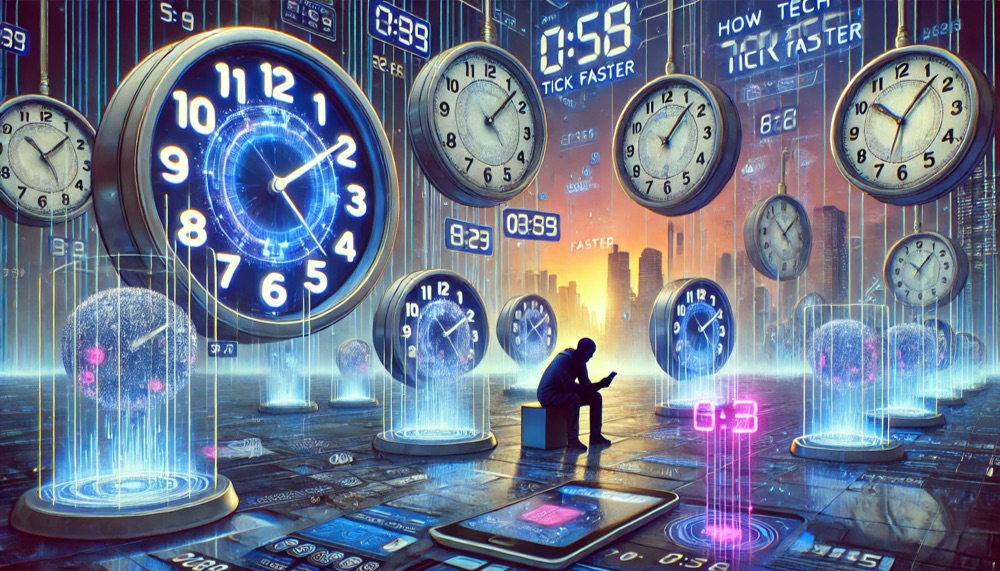
How Tech Is Making Time Tick Faster
The pervasive use of gadgets could affect our experience of time, as neuroscience begins to unravel one of the biggest mysteries of human consciousness.
Time is one of the most arcane subjects of study in multiple disciplines, a topic fascinating to philosophers and scientists but famously difficult to study. Philosophers have long contemplated its apparent plasticity: why and how does time seem to go slower during some events, fly quickly in others, and disappear altogether during certain peak experiences?
Scientists who study the brain are just beginning to unravel how complex the perception of time is, and their research intersects into how gadgets and technology are reshaping human consciousness in fundamental ways.
Does Time Really Go Faster and Slower?
Time, of course, can be measured objectively in seconds, minutes, hours and other units. But the human experience of time, i.e., how time feels as we move through it, is altogether a different beast. Where exactly in the brain do we process and experience time? The answer to that question has traditionally eluded neuroscientists, since the perception of time has no defined location in the brain, unlike other senses like sight, hearing, touch and smell.
From a subjective point of view, neuroscientists are discovering that time is actively constructed by the human mind through complex cognitive processes of both past memory and future projection, both of which use the same parts of the brain. From the brain’s point of view, past and future are nearly the same, making people’s sense of time highly variable.
For example, neuroscientist David Eagleman of Baylor College of Medicine, who rose to prominence for his research on time and perception in the brain, conducted a famous experiment on how time seems to slow down for human beings during traumatic or scary experiences.
Eagleman initially tried conducting experiments on roller coaster riders, but, finding that amusement park rides did not generate enough fear, devised an experiment to drop volunteers backwards from a 150-foot height without attached ropes into a special net breaking their fall. Volunteers reached 70 mph during the three-second fall. Interestingly, volunteers estimated their own fall lasted about a third longer than dives they saw other volunteers take.
Eagleman discovered that this “time warping” seems like a trick played by one’s memory. During experiences of fear and trauma, a brain area called the amygdala becomes more active, laying down an extra set of memories that augment data recorded in other areas of the brain.
“In this way, frightening events are associated with richer and denser memories,” said Eagleman to LiveScience. “And the more memory you have of an event, the longer you believe it took.”
Eagleman said this illusion “is related to the phenomenon that time seems to speed up as you grow older. When you’re a child, you lay down rich memories for all your experiences; when you’re older, you’ve seen it all before and lay down fewer memories. Therefore, when a child looks back at the end of a summer, it seems to have lasted forever; adults think it zoomed by.”
Do Gadgets Add to the “Density” of Experiences?
Eagleman’s idea of “richer, denser” experiences impacting our memory and sense of time poses interesting questions as technology increasingly plays a role in our everyday life. Do activities like taking pictures of an experience for Instagram, checking into Facebook and live-tweeting add to the perceptual density of experiences, magnifying our emotional acuity as they happen and helping us pay attention to the density of details during an event?
Technology and gadgets do offer constant novelty, and novelty is one major factor that can distort our memory, since our brains respond more strongly to newness over repetition. Various stimuli such as interruptions affect our sense of time in an experience and could cause our brains to store them differently, impacting our memory of them.
Eagleman investigated the impact of novelty on time and memory by asking volunteers to estimate the duration of flashes of light during an experience; those flashes that were the first in a series, or broke an established pattern, seemed to last longer because of their newness, though they may have been essentially the same duration.
The result is an interesting paradox: a boring event takes forever when sitting through it, but it seems to pass by quickly in our memory of it. But for something exciting, time flies during the experience of the event, but remembering it is dense with detail, making our sense of its duration stretch out.
With boring events, there was little to remember, so the brain collapses the sense of duration. But in memories of something fun, the richness of details seems to expand the event’s duration in our minds and weigh its importance in our memory.
Technology is often excoriated as a constant distraction or interruption to work, relationships, sleep and other fundamental human experiences. But when it comes to breaking up the routine of certain events or even causing us to take a moment to pause and take a closer look at the minutiae of everyday life, it may offer enough novelty to make an experience pass by faster while expanding its weight in our memory, leaving behind a richer tapestry of consciousness to draw upon.
How Fast is Too Fast?
Technology’s precise impact on our experiences of time has yet to be measured, but it’s already shown to affect certain cognitive processes. A study on “Google brain” found that people are now more like to “outsource” the memory of certain types of data in a process called “transactive memory” — instead of remembering facts, they are more likely to remember how to find and find these facts instead.
“We’re not thoughtless empty-headed people who don’t have memories anymore,” said Betsy Sparrow, research team leader and psychologist at Columbia University, which conducted the study. “But we are becoming particularly adept at remembering where to go find things. And that’s kind of amazing.”
In terms of biochemistry, studies show gadgets offer boosts of certain brain chemicals associated with novelty and pleasure. Constant usage of electronics boosts doses of dopamine in the brain, according to scientists. Juggling e-mail, phone calls, texts and other incoming information is changing how people think and behave by playing to primitive impulses that respond to immediate threats and opportunities. These tech interruptions produce a hit of dopamine that researchers say is addictive and could rewire a brain to crave constant stimulation.
“The technology is rewiring our brains,” said neuroscientist Nora Volkow, director of the National Institute of Drug Abuse, to the New York Times.
However, researchers grapple with the question of whether this rewiring is beneficial to human beings, or whether it is causing undue stress. Many people are now exploring deliberate slowdowns or abstaining from technology for periods of time in efforts to recharge — and to pay closer attention to the experiences of life.
A constant through line of much neuroscience research marvels at the amazing plasticity of the human brain — of its ability to grow and make new connections between different parts. Exploration on the impact of technology on the brain’s inner workings is only beginning, particularly when it comes to perceiving the past, present and future, but there’s evidence that the influx of technology is already making time move faster for us collectively: a study found that a 62-year old in 1997 perceived time is about 7.69 times as fast as that perceived by a 62-year old in 1897.
Changes in how we perceive the speed of time will likely have a potentially significant long-term impact on our productivity, our lifestyles and our ability to cope with the rapid pace of changes wrought by technology. Time indeed may seem like it is moving faster as we speed into the future, but whether that’s from enjoyment or from trying to keep up with modern lifestyles remains unknown.
The Ultimate Juggling Act
The ability for humans to hold the past, present and future in their minds is a hallmark of their consciousness. Without the ability to juggle various dimensions of time simultaneously in the thought process, humans would have never evolved key innovations central to evolution: agriculture, for example, or anything involving the observation of cause and effect.
Indeed, many devastating psychological and neurological disorders – such as schizophrenia or strokes — show how an impairment of the perception of time and the ability to construct, retain and recall memory can destroy a sense of self and enjoyment of life.
Yet we don’t have a complete picture on how the human brain pieces together the perception of time, making it one of the last frontiers of understanding and one of the most enduring human mysteries. Scientists are only beginning to unravel the brain’s inner workings of time and how human beings perceive it, as the rapid pace of technology continues to impact the delicate balance between past, present and future in our minds.
